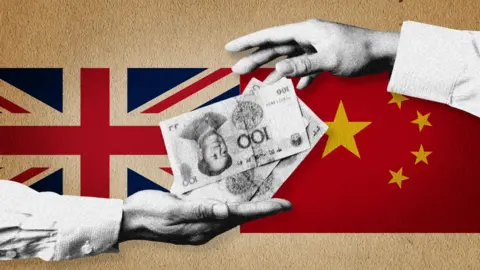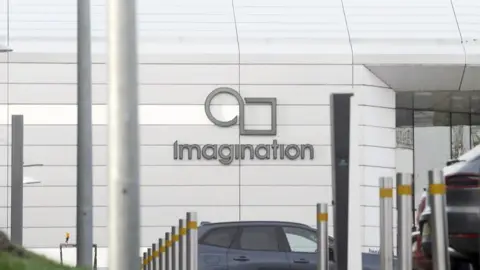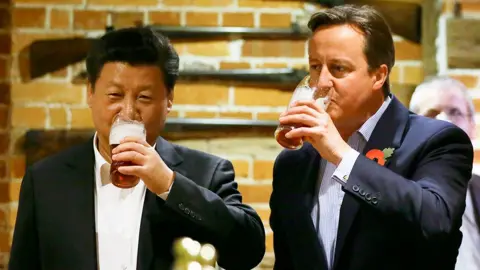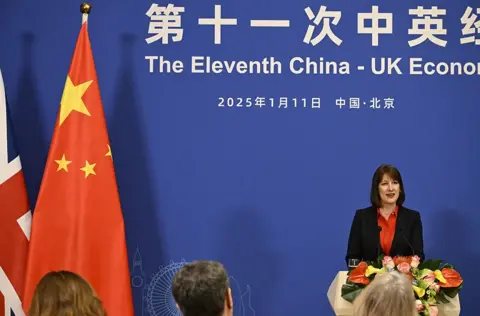
 Getty Images
Getty Images
China has financed tens of billions of pounds' worth of investment in UK businesses and projects this century, some of which gave it access to military-grade technology, BBC Panorama has learned.
The spending spree - worth £45bn ($59bn) at 2023 prices - was at its height following a 2015 Chinese state directive, aimed at making the country a global leader in high-tech industries.
The UK has been the top destination among G7 nations for these investments, relative to the size of its population and economy, according to US-based research group AidData.
Panorama has investigated how this led to cutting-edge technology and skills being transferred to China. The UK was "far too free in allowing access to strategically important industries", according to a former head of GCHQ.
The BBC was given exclusive early access to data collected by AidData, a research group at William & Mary, a university in the US state of Virginia. A leading specialist in tracking how governments spend money overseas, AidData receives funding from governments and charitable foundations around the world.
Some government-backed Chinese investments were purely commercial but others were in line with Beijing's strategic objectives, according to Dr Brad Parks, AidData's executive director.
These objectives were laid out by China's communist leaders in a strategic plan 10 years ago, called "Made In China 2025". It set ambitious targets for the country to become the industry leader in 10 high-tech sectors, including aerospace, electric vehicles and robotics.
This was a far-sighted strategy, according to Prof Keyu Jin of Hong Kong University of Science and Technology: "It's the longer-term strategic thinking that China has always had, and I'd argue that many other countries also should have."
With access to AidData's research, the BBC has investigated how the purchase of some UK companies has led to technology with military potential to be transferred to China.
Imagination Technologies, a Hertfordshire-based firm, was one of the companies Panorama looked at.
It specialises in semiconductor design - in other words, designing the tiny electronic circuits inside chips that power devices such as computers and smartphones.


Imagination's UK base in Hertfordshire
In 2017, Imagination had recently lost its most important client, Apple, and had seen its share price fall dramatically. It was snapped up for £550m by a private equity firm, Canyon Bridge, based at that time in the US state of California.
The Canyon Bridge fund that bought Imagination had one investor - Yitai Capital, whose largest stakeholder is China Reform. This organisation reports to the State Council, the body responsible for carrying out party policies and laws.
Two months before Canyon Bridge bought Imagination in the UK, it had tried to buy a semiconductor company in the US. However, that purchase had been blocked by the US's investment-screening laws.
The value of Imagination lay in its intellectual property - the expertise of its engineers, amassed over decades.
A potential buyer would be buying into this expertise. What is more, the algorithms behind its technology, although developed for other products, could be put to military use in missiles and drones.
In his first interview since leaving Imagination, the company's former CEO, Ron Black, says the UK government vetted the deal, and he was told "unequivocally" by Canyon Bridge that China Reform would be a passive investor, only interested in making money.


Former Imagination CEO Ron Black became worried about the motives of the company's Chinese investors
However, in 2019, Mr Black says he was summoned to a meeting in Beijing, where he was asked to work directly for China Reform, and oversee the wholesale transfer of Imagination's technology and expertise to China.
"I think [the China Reform representative] said specifically 'from the heads of the British engineers to the Chinese engineers, then lay off the British engineers and you'll make a lot of money'," says Mr Black.
He refused, but he says that several months later, China Reform tried to install four new directors "with no understanding of semiconductors" directly onto the board of Imagination Technologies.
"The only attributes they appeared to have was a relationship with China Reform," he adds.
Convinced that Imagination's technology had the capacity to be used for military purposes, Mr Black began reaching out to contacts in the UK government.
He says he was given a sympathetic hearing, but was told this was a private industry matter, and there was not much anyone could do.
Fearful about the possible transfer of military-grade technology, Mr Black resigned. At that point, he says, the UK government started to take an interest, and China Reform halted its attempt to install new directors.
Mr Black withdrew his resignation but was fired three days later. He was later found by an employment tribunal to have been unfairly dismissed.
After he left the company, Imagination's homegrown technology was transferred to China.
According to Imagination, its technology is not used in military products. It told Panorama: "Imagination has always complied with applicable export and trade compliance laws in respect of its commercial licensing of semiconductor IP technology and related transactions."
Canyon Bridge told Panorama "the Imagination transaction was sourced and led exclusively by Canyon Bridge and its advisers".
Panorama contacted China Reform, but it has not commented on Mr Black's allegations.
The Chinese Embassy says its government "has always required Chinese enterprises operating overseas to strictly comply with local laws and regulations" and that these enterprises "also contribute actively to local economic growth, social development and job creation - efforts that have been widely welcomed by many countries".

 Getty Images
Getty Images
2015: Chinese leader Xi Jinping and Prime Minister David Cameron share a pint of beer during Xi's state visit to the UK
In 2017, the UK had fewer powers to stop the sale of a company such as Imagination to Chinese owners. Two years earlier, China's leader, Xi Jinping, had been welcomed on a state visit, with David Cameron's Conservative government hailing the start of a "golden era" in China-UK relations.
"We thought China was basically a very friendly power and there was lots of money to be made," says Sir Jeremy Hunt. In 2015 he was health secretary, and later held other government posts, including chancellor of the exchequer and foreign secretary. "But under the surface, we were beginning to sense a much more assertive China."
The challenge of how to trade with China, while keeping the UK safe, remains an unresolved issue.
"This is the trillion-dollar question," says Sir Jeremy Fleming, a former head of GCHQ.
The UK has benefited from a trading relationship with China, and from its investment, over the past couple of decades, he says. On the other hand, he adds, the UK has sometimes forgotten that this investment could be used against its own interests.
"My personal view," he says, "is that we have been far too free in allowing access to strategically important industries in science and technology."
Sir Jeremy contrasts the UK's approach with the control exerted by the Chinese: "They have been very strategic and careful not to allow Western companies to invest or to get involved in key bits of their industry which are strategically important."


Former GCHQ boss Sir Jeremy Fleming: How to balance trade and security objectives is a "trillion-dollar question"
Europe as a whole and some US businesses were naive about China in 2017-18, according to John Bolton, former US national security advisor during the first Trump administration.
"There was a reluctance to think we were slipping back into some kind of Cold War," he says.
Mr Bolton has recently been indicted in the US on several charges pertaining to the alleged mishandling of classified information. He maintains his innocence.
Some experts argue that Beijing did nothing wrong, and that the UK was just short-sighted.
China is effectively a one-party state and some argue its autocratic system succeeds because of its long-term strategic planning.
The results, seen from China's perspective, have been "nothing short of remarkable", says Prof Keyu Jin.
"One of the key advantages of China's political system is the ability to set multi-decade-long goals," she says. "And you do the planning. You do the investment. You set the strategy. You influence the financing. It's not a five-year thing."


Prof Keyu Jin thinks that the results of China's long-term strategic planning have been "remarkable"
In this century, China has been the world's largest overseas lender, to the tune of £1.6tn ($2.1tn) at 2023 prices, AidData's research has revealed.
The high point for Chinese overseas investment was during 2016 and 2017, according to Dr Parks. After this point, he says, many countries started strengthening screening mechanisms on national security grounds.
The US, Germany and Italy tightened vetting on foreign investment by 2018. The UK followed suit in 2022.
Sir Jeremy Fleming is cautiously optimistic that lessons have been learned.
"We have a much stronger regime in place," he says. "But would I say the process is watertight? Absolutely not."
In 2024, a Labour government was elected, but it faced the same issue as its Conservative predecessor - namely, that the UK needed economic growth and China could help.
"One big problem in Europe, including the UK, is that there's not enough investment and funding," says Prof Keyu Jin. "China is very happy to finance some of these projects. And there are lots of areas where there's no real threat of national security."
Chancellor Rachel Reeves has already been on a mission to Beijing to secure foreign investment.

 Getty Images
Getty Images
January 2025: Chancellor Rachel Reeves speaks in Beijing during a trip aimed at improving UK-China economic ties
But some Labour MPs are concerned the government has not published its China audit, which it carried out as part of an election manifesto commitment.
"I was promised by the foreign secretary that it would be published," says Dame Emily Thornberry MP, the chair of the House of Commons Foreign Affairs Committee. "Then we hear that the China audit has happened but we're not going to be told about it, we're only going to get a few lines."
The Foreign Office has told Panorama it did not publish its full audit because of its security classification.
It says it takes "a consistent and strategic" approach to China, the UK's third largest trading partner, it is committed to supporting UK businesses to "trade securely", and it will use its powers to protect UK interests.
.png)
 3 hours ago
2
3 hours ago
2








 English (US) ·
English (US) ·